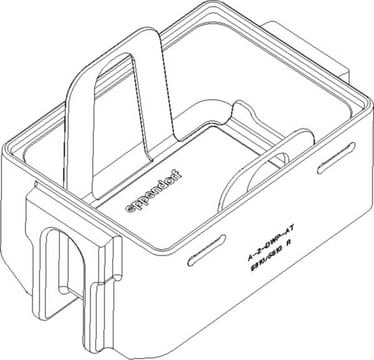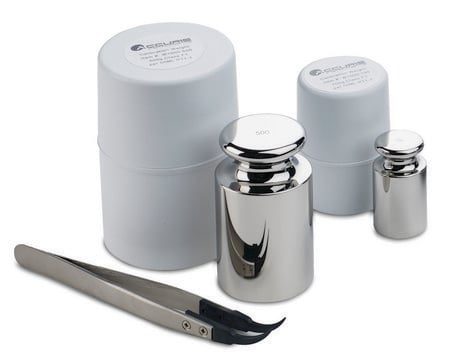EP951040601
Eppendorf® Protein LoBind Microplate 384/V-PP
PCR clean, V-bottom clear wells, white border, pack of 240 ea (10 bags × 24 plates)
Iniciar sesiónpara Ver la Fijación de precios por contrato y de la organización
About This Item
UNSPSC Code:
41106300
Productos recomendados
material
V-bottom clear wells
polypropylene
sterility
non-sterile
feature
PCR clean
lid: no
skirt
packaging
pack of 240 ea (10 bags × 24 plates)
manufacturer/tradename
Eppendorf® 951040601
well volume
140 μL
color
clear wells
white border
suitability
suitable for (protein analysis)
suitable for PCR
General description
Microplate 384/V-PP, Protein LoBind, wells clear, 140 µL, PCR clean, white, 240 plates (10 bags × 24 plates)
- Eppendorf LoBind material ensures excellent sample recovery for improved assay results
- Free of surface coating (e.g., silicone) to minimize the risk of sample interference
- Lot-certified PCR clean purity grade: free of human DNA, DNase, RNase and PCR inhibitors
- Available in tube, microplate, and deepwell plate formats for easy-up scaling
- Unique OptiTrack® matrix: 30 % faster sample identification and fewer pipetting errors
- RecoverMax® well design: optimized well geometry for minimal remaining/dead volume and excellent mixing properties
- Raised well rims and a smooth surface ensure reliable sealing in plates
Features and Benefits
- Eppendorf LoBind material ensures excellent sample recovery for improved assay results
- Free of surface coating (e.g., silicone) to minimize the risk of sample interference
- Lot-certified PCR clean purity grade: free of human DNA, DNase, RNase and PCR inhibitors
- Available in tube, microplate, and deepwell plate formats for easy-up scaling
- Unique OptiTrack® matrix: 30 % faster sample identification and fewer pipetting errors
- RecoverMax® well design: optimized well geometry for minimal remaining/dead volume and excellent mixing properties
- Raised well rims and a smooth surface ensure reliable sealing in plates
Legal Information
Eppendorf is a registered trademark of Eppendorf AG
OptiTrack is a registered trademark of Eppendorf AG
RecoverMax is a registered trademark of Eppendorf AG
Certificados de análisis (COA)
Busque Certificados de análisis (COA) introduciendo el número de lote del producto. Los números de lote se encuentran en la etiqueta del producto después de las palabras «Lot» o «Batch»
¿Ya tiene este producto?
Encuentre la documentación para los productos que ha comprado recientemente en la Biblioteca de documentos.
Kelly Hodge et al.
Journal of proteomics, 88, 92-103 (2013-03-19)
Mass spectrometry, in the past five years, has increased in speed, accuracy and use. With the ability of the mass spectrometers to identify increasing numbers of proteins the identification of undesirable peptides (those not from the protein sample) has also
Arzu Umar et al.
Proteomics, 7(2), 323-329 (2006-12-14)
Proteomics assays hold great promise for unraveling molecular events that underlie human diseases. Effective analysis of clinical samples is essential, but this task is considerably complicated by tissue heterogeneity. Laser capture microdissection (LCM) can be used to selectively isolate target
Byung-Gyu Kim et al.
Proteomics, 6(4), 1166-1174 (2006-01-20)
Runx2 is a key transcription factor in osteoblast differentiation, and its activity is regulated by fibroblast growth factors (FGFs). Craniosynostosis, characterized by premature suture closure, results from mutations that generate constitutively active FGF receptors (FGFRs). We previously showed that FGF/FGFR-activated
Hongchang Qu et al.
Immunobiology, 218(4), 496-505 (2012-07-17)
Therapeutic modulation of the complement system has become increasingly important in line with the growing recognition of the role of complement in numerous diseases. Compstatin, a peptidic inhibitor that acts at the central level of the complement cascade, is currently
Steven J Bark et al.
Journal of proteome research, 6(11), 4511-4516 (2007-09-14)
Differential recovery of peptides due to nonspecific adsorption can seriously compromise reproducibility and quality of proteomic data for peptide analyses by liquid chromatography-mass spectrometry (LC-MS). This study demonstrates large variations in reproducibility and quantitation of LC-MS data for peptides derived
Nuestro equipo de científicos tiene experiencia en todas las áreas de investigación: Ciencias de la vida, Ciencia de los materiales, Síntesis química, Cromatografía, Analítica y muchas otras.
Póngase en contacto con el Servicio técnico







